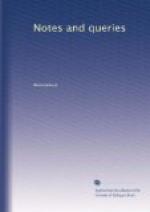Mr. Editor,—Legour asks, why the people in Suffolk call a lady-bird “Bishop Barnaby?”
I give the following from the late Major Moor’s Suffolk Words.
“Bishop-Barney. The golden bug. See Barnabee. In Tasser’s Ten Unwelcome Guests in the Dairy, he enumerates ’the Bishop that burneth’ (pp. 142. 144.), in an ambiguous way, which his commentator does not render at all clear. I never heard of this calumniated insect being an unwelcome guest in the dairy; but Bishop-Barney, or Burney, and Barnabee, or Burnabee, and Bishop-that-burneth, seem, in the absence of explanation to be nearly related—in sound at any rate. Under Barnabee it will be seen that burning has some connection with the history of this pretty insect.”
“Barnabee,” writes the Major, “the golden-bug, or lady-bird; also Bishop-Barney: which see. This pretty little, and very useful insect, is tenderly regarded by our children. One settling on a child is always sent away with this sad valediction:—
“Gowden-bug,
gowden-bug, fly away home,
Yar house is bahnt
deown and yar children all gone.”
To which I add another nursery doggerel less sad:—
“Bishop, Bishop-Barnabee,
Tell me when your wedding be,
If it be to-morrow day
Take your wings and fly away.”
The Major adds, “It is sure to fly off on the third repetition.”
“Burnt down,” continues the Major, “gives great scope to our country euphonic twang, altogether inexpressible in type; bahnt deeyown comes as near to it as my skill in orthography will allow.”
Ray, in his South and East Country Words, has this:—
“Bishop, the little spotted beetle, commonly called the lady-cow or lady-bird. I have heard this insect in other places called golden-knop, and doubtless in other countries it hath other names. (E. W. p. 70) Golden-bugs the common Suffolk name.”
J.G.
Southwold, Nov. 16. 1849.
* * * * *
TRADE EDITIONS—COTTLE’S LIFE OF COLERIDGE.
Sir,—In the 2nd vol. of Mr. Collier’s valuable and interesting Extracts from the Registers of the Stationers’ Company, p. 28, is the following entry:—
“Thos. Dason. Licensed unto him the praise of follie; to print not above xv deg. of any impression, with this condition, that any of the Company may laie on with him, reasonablie at every impression, as they think good, and that he shall gyve reasonable knowledge before to them as often as he shall print it.”
This is both curious and important information as being, in all probability, the earliest recorded instance of a custom still kept up amongst booksellers, and which now passes under the designation of a “Trade edition;” the meaning of which being, that the copyright, instead of being the exclusive property




